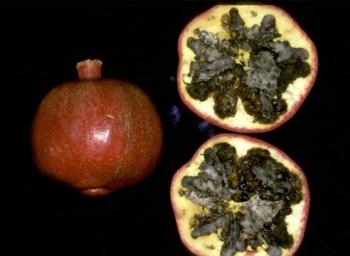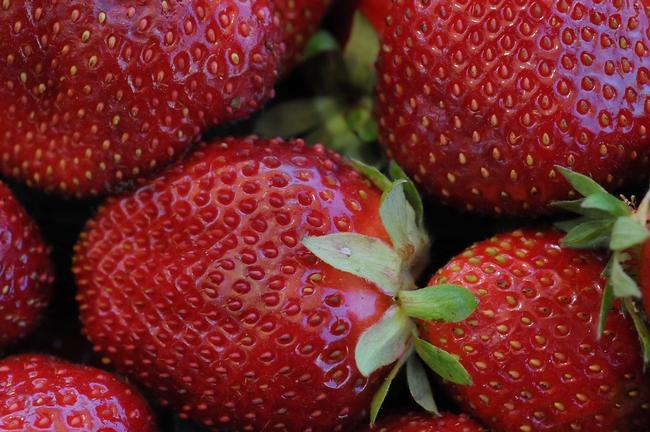Posts Tagged: Richard Molinar
UC scientists studying 'baffling' pomegranate ailment
A mysterious sudden crippling or death of pomegranate trees may be due to cold temperatures, said a story in Western Farm Press.
Three farmers and Themis Michiliades, UC Davis plant pathologist based at the UC Kearney Agricultural Research and Extension Center, agreed that low temperatures have a lot to do with the problem. Michailides cited an Iranian research paper that showed similar cold snap damage. Michailides and Richard Molinar, UC Cooperative Extension farm advisor in Fresno County, said damage from dieback this year was more common in sandier soils, perhaps because heavier soils hold moisture.
Writer Dennis Pollock reported on the problem in his article about a recent pomegranate field day at Kearney. At the field day, Michailides also reported on "black heart" of pomegranate, caused by Altenaria fungus, and cankers caused by species that include Neofusicoccum mediterraneum.
Claude Phené, a retired USDA-ARS researcher, discussed a two-year-old pomegranate irrigation and fertigation trial at Kearney.
Western Farm Press runs 1,000-word story on Kearney blueberry event
The annual Blueberry Open House at the UC Kearney Agricultural Research and Extension Center last month warranted lengthy coverage by Western Farm Press.
Freelance writer Dennis Pollock reported that Manuel Jimenez, UC Cooperative Extension advisor in Tulare County, a small-scale farming expert, walked among the mature blueberry plants at Kearney, describing their good points and bad points.
"The perfect blueberry would be one that is big, firm, sweet, easy to harvest and grows in high pH (soil conditions)," he said.
At the event, Richard Molinar, UCCE advisor in Fresno County, small-scale farming, conducted a blueberry tasting, allowing those who attended to vote for their favorite three varieties. He said that variety isn't the only factor impacting flavor.
"Flavor is also affected by weather, soil factors, plant nutrition and irrigation frequency," Molinar said.
Jimenez introduced growers to two new research projects in blueberries:
- Jimenez and Larry Schwankl, Kearney-based UCCE irrigation specialist in the UC Davis Department of Land, Air and Water Resources, have teamed to study the effects of varying irrigation levels on blueberries.
- Jimenez has grafted popular blueberry varieties onto the roots of farkleberry (Viccinium abroreum), which has greater tolerance of alkaline soils like those found in the San Joaquin Valley. By reducing or eliminating soil and water acidification, using the alternate rootstock may provide a significant cut in production costs.

Manuel Jimenez leads a tour of the 15-year-old blueberry research plot.
Chandler strawberries get attention
UC strawberry varieties — Chandler in particular — was the topic of a Los Angeles Times article by David Karp.
According to the article, Chandler was introduced in 1983 and was dominant in Southern California production in the late '80s and early '90s, before being surpassed by other varieties. Chandler was bred by Victor Voth and Royce Bringhurst of the University of California.
This year, a well-known strawberry grower among Southern California farmers markets has resumed growing the Chandler variety. Harry's Berries otherwise grows Gaviota and Seascape varieties, both also developed by the UC strawberry breeding program, but will be bringing Chandler berries to markets this year.
4-H Million Trees Project shelters Pacifica Gardens with natives and fruit trees
The Pacifica Tribune
4-H volunteers continue to plant trees for the 4-H Million Trees program, which was started in Pacifica by 4-H member Laura Webber. Reporter Jane Northrop covered 4-H volunteers planting hedge trees at Pacifica Gardens recently.
So far, the paper reports, the program has seen at least 41,000 children plant 350,000 trees.
The program has spurred many 4-H members to propose tree-planting projects at nearby schools, parks and neighborhoods. One of the teens who wrote a grant proposal for another tree-planting event explained why she took on the project.
"I basically wanted to write the grant because I thought it would be a great experience for me and I wanted to help in more ways than just showing up to the plantings. I also wanted to really push myself to do something that I had never done before," said Julia Hurley, a Pacifica 4-H member and eighth-grader.
Fresno farm meeting attracts Asian growers
Fresno Bee
Reporter Robert Rodriguez covered a meeting of Southeast Asian farmers in Fresno, where one of the primary topics was government regulations.
Richard Molinar, UC Cooperative Extension advisor in Fresno, has helped Southeast Asian farmers comply with regulations. At the meeting, he urged farmers to spread the word about how to follow government regulations and who can help.
"Part of this is your responsibility to find out what you need to do," he said. "This not an insurmountable problem."
The meeting was presented by the National Hmong American Farmers, and USDA's Joe Leonard, Jr., was the keynote speaker.
'Locavore' movement likely to spur food safety policies
The increasing popularity of buying locally produced foods directly from farmers is accompanied by a parallel rise in concerns about keeping local consumers safe from the same pathogens responsible for nationwide outbreaks of salmonella, listeria and E. coli, according to the second in a three-part MSNBC series about food safety.
According to the story, Richard Molinar, small farm program advisor for the University of California Cooperative Extension in Fresno County, thinks the local food movement will put pressure on local farms to develop food safety plans.
“Certainly more people are wanting to buy fresh and buy local; that doesn’t mean that they’re not concerned about food safety,” said Molinar, who helps small farmers develop scaled-down food safety manuals. “When you go to swap meets or farmers markets, I think at some point consumers are going to want to see or know if those farmers have some kind of policy in place.”

Richard Molinar, center, and his assistant Michael Yang, left, with a local farmer.
Report shows more U.S. farmers relying on Internet
The number of farmers with Internet access on a variety of digital gadgets has dramatically increased, changing the way farms do business, reports Gosia Wozniacka of the Associated Press. Despite the enormous benefits to using the new technology, barriers remain for many farmers, said Richard Molinar, a small farm advisor at the University of California Cooperative Extension in Fresno. Older farmers and immigrant farmers tend not to use the Internet or digital devices. And while the cost of computers, phones and Internet connections has fallen, for small farmers the expense can be prohibitive.
Other news:
Researchers closing in on nematodes
Tim Hearden, Capital Press
University of California researchers are trying to perfect a treatment for nematodes, a ubiquitous pest that can damage walnut trees and other crops. UC Cooperative Extension scientists have been working with a foliar applied systemic nematicide called Movento, a new product from Bayer CropScience that replaced the abandoned Nemacur. A team led by Michael McKenry, a specialist at the UC's Kearney Agricultural Research and Extension Center in Parlier, achieved a 50 percent reduction in lesion nematode populations in walnut orchards over about a six-month period using variations in applications and timing.

At a UC field day, farmers could get more information on specific varieties with their smart phones.



